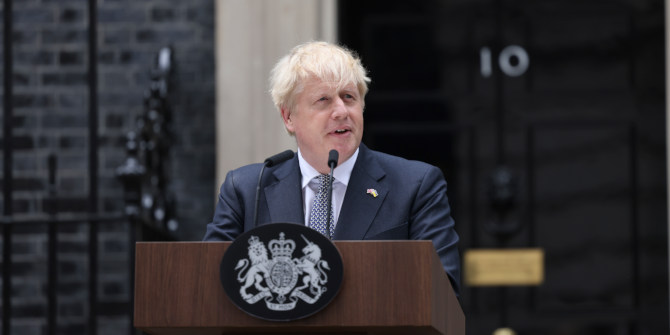Emmanuel Macron’s decision to call a snap legislative election in France has been viewed as a major political gamble. Joseph Downing argues the election could represent the culmination of two decades of decline for French mainstream parties.
In the wake of the results of the 2024 European Parliament elections, the European project is looking its most precarious in a decade. Notably, the pillars of the European project, France and Germany, both saw big gains for far-right, Eurosceptic parties.
This has caused French President Emmanuel Macron to take a serious political gamble and call snap legislative elections, hoping the election will demonstrate that the opposition National Rally does not have the support to govern at the national level. However, the continued rise of the National Rally and its young President, Jordan Bardella, are part of broader trends that could leave France’s political landscape in a position of precarity that has not been seen for decades.
The decline of established parties in France
If the near military coup at the height of the Algerian war of independence in 1958 and the student uprising of 1968 can be characterised as “hot” political crises in France, the demise of the established party system over the last two decades has been a distinctly “cooler” crisis for French politics.
France has seen the steady ascension of the National Front, now the National Rally, during this period. While there has undoubtedly been a move to the right in French politics more generally, the party’s rise has been to at least some extent driven by a clear strategy, spearheaded by Marine Le Pen, to drag it kicking and screaming into the mainstream. It has transformed from an ethno-nationalist and antisemitic party with a bullish ex-commando leader in her father, into a party that now focuses more on restoring France’s position in the world than on the xenophobia of the past.
The National Rally benefits from a significant opposition advantage because it has yet to be tainted by holding power at the national level. This is important because France’s party-political architecture has essentially disintegrated, with both the centre-right Republicans (under Nicolas Sarkozy from 2007 to 2012) and the centre-left Socialist Party (under François Hollande from 2012 to 2017) losing popularity after their perceived failure to deliver while in office.
This combined with corruption cases involving centre-right politicians (Sarkozy and then François Fillon) aided Macron in his initial run to the Élysée Palace in 2017. However, as Macron is a centrist, the gravity of this shift and what it means for the future of France and Europe has been somewhat lost. Additionally, Macron faces a succession vacuum, with no successor apparent in either his party or the broader French political milieux.
Given Le Pen’s appearance in the previous two presidential run offs, she appears well placed to compete for the next presidency. Her protégé Bardella cannot be overlooked either. The fact the current centre-right Republican leader Eric Ciotti has already suggested the idea of an alliance with the National Rally underlines the significant reversal of fortunes that has occurred, where the mainstream has been replaced by the extremes.
Where the National Rally goes with Bardella
European elections are known for their low turnout and protest votes against the status quo, with the European Union serving as a lightning rod for a range of grievances it may or may not have the ability to influence. The legislative elections will be a far more reliable barometer of the mood in France. It should also be noted that the last two presidential elections were as much a vote against Le Pen as an endorsement of Macron.
The rise of Bardella nevertheless says much about the journey the National Rally has been on. He defies the logic of much of the European far right, with immigrant roots in Algeria and Italy. He also grew up in one of the much-maligned Paris “banlieues”, the poor suburban housing estates that are often taken as a symbol of inequality in the French capital.
While many among the French political establishment studied politics, Bardella studied geography before dropping out to concentrate on his political career. He is not shy of talking about his humble origins and is one of the few high-profile politicians who can draw on first-hand experience of disadvantage and geographical marginalisation. Even the leader of the far left, Jean-Luc Mélenchon, though born to European settler parents in Morocco, lacks some of the council estate credentials of Bardella.
The challenge for the French centre will be to reclaim the ground they are now losing to Bardella, Le Pen and the National Rally. If they are to do so, they will need to learn important lessons that have thus far escaped political and bureaucratic elites in Brussels, Paris, Berlin and London.
For while the National Rally’s rise in part reflects a successful political strategy, it is also an expression of the failure of Europe’s mainstream to address vital issues such as the cost of living over a period of decades. This inability to deliver the basics is a key reason why many voters are now turning to the far right. If hope is to beat hate in the political arena, voters must be given something to hope for.
Note: This article gives the views of the author, not the position of EUROPP – European Politics and Policy or the London School of Economics. Featured image credit: Obatala-photography / Shutterstock.com



